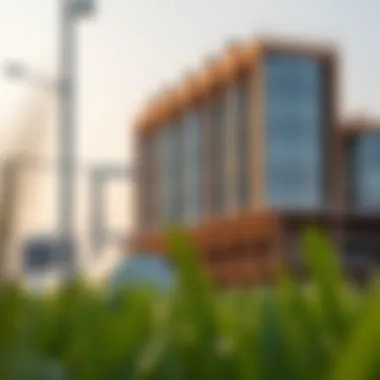Dynamics of Dubai's Industrial Sector: Growth and Insights


Intro
The industrial sector in Dubai is a bustling hive of activity, playing a crucial role in the broader economic narrative of the emirate. Through its development, the area has transformed into a key contributor to revenue generation, thanks to a combination of strategic infrastructure, policy support, and the integration of innovative technologies. This exploration seeks to shine a spotlight on the dynamics of the industrial area, providing not only a backdrop to the intimate details of property prices and investment opportunities but also framing it within the contemporary context of sustainability and technological advancement.
As we delve deeper, readers will encounter a rich tapestry of insights. From understanding current market trends to unearthing potential investment avenues, this narrative aims to equip real estate agents, investors, and analysts with the knowledge necessary to navigate this complex landscape. The allure of Dubai's industrial zone, marked by its rapid growth and ongoing developments, captures the attention of many; thus, it is pertinent to unpack these dynamics with precision and clarity.
Beyond the mere facts and figures, this article will elucidate how the confluence of modern infrastructure, legal frameworks, and sustainability initiatives paves the way for future opportunities. By assessing market trends and investment prospects, we aim to furnish stakeholders with a comprehensive understanding necessary for informed decision-making.
So, buckle up as we embark on this enlightening journey into the heart of Dubai's industrial domain.
Prologue to the Industrial Area in Dubai
The industrial area in Dubai is more than just a stretch of factories and warehouses; it's a significant player in the broader context of the emirate's economy. Understanding this area reveals not only its contribution to economic growth but also the intricate web of connections between various industries, regulatory frameworks, and investment opportunities. Unpacking this topic is essential for anyone looking to delve into the bustling market of Dubai, especially real estate agents, investors, buyers, and analysts who can benefit from a nuanced understanding of the industrial sector's dynamics.
Overview of Dubai's Industrial Sector
Dubai’s industrial sector acts as a linchpin for its economic machinery, housing a diverse range of industries such as manufacturing, logistics, and assembly. The landscape is peppered with specialized zones that cater to specific economic activities, such as Dubai Silicon Oasis for tech and Dubai Industrial City for manufacturing. Each of these areas is designed strategically to optimize operations and streamline supply chains.
A key feature of this sector is the emphasis on innovation and technology. For instance, many industrial units now integrate automated systems and smart technologies that enhance productivity. Moreover, an ecosystem thrives where traditional and high-tech industries coexist, creating a fertile ground for cross-industry collaborations. Investors are increasingly drawn to the sector, motivated by its potential for profitability and sustainability.
Importance to the Economy
The significance of the industrial area stretches far beyond its physical footprint. It plays a pivotal role in diversifying Dubai's economy, reducing reliance on oil and tourism. According to recent reports, the industrial sector contributes over 10% to the emirate's GDP, and this figure is steadily climbing as new sectors emerge and existing industries expand.
Furthermore, the industrial area creates a multitude of jobs, from entry-level positions to high-skilled roles in advanced manufacturing and technology. This employment generation not only boosts the local economy but also attracts a workforce from around the globe, fostering a rich cultural mix and enhancing innovation.
Moreover, strong investments have birthed infrastructure developments that connect industrial zones with major transport networks, ensuring seamless logistics and supply chain management. This connectivity is crucial as it underpins the strategic positioning of Dubai as a global trade hub.
In summary, the industrial area of Dubai is a cornerstone of the city's economy. It embodies both the challenges and opportunities present in a rapidly developing market. As potential investors and industry players explore this dynamic environment, understanding these foundational elements can provide invaluable insights into future prospects and strategic directions.
Historical Development of Industrial Areas
The historical development of Dubai's industrial areas provides a clear insight into how a city transforms from a small trading port into a global hub of commerce and industry. This transformation is not just about bricks and mortar; it involves vision, strategy, and policy that shape the region's industrial landscape. Understanding the evolution of these areas is important for stakeholders, including investors and real estate agents, as it highlights how past decisions influence present opportunities and future growth.
Key Milestones in Growth
The industrial sector in Dubai has grown by leaps and bounds over the past few decades. Some key milestones include:
- Establishment of Dubai Industrial City (2004): A vital step that focused on manufacturing and logistics, aiming to attract both local and foreign investments.
- Creation of Free Zones: The introduction of Jebel Ali Free Zone in 1985 has been a game-changer. It allowed for 100% foreign ownership and duty-free exemptions, making it incredibly appealing for global investors.
- Infrastructure Development: The completion of road networks and port expansions, like the Jebel Ali Port, has significantly improved the accessibility of industrial zones. Such infrastructure supports not just the movement of goods but also the logistics sector.
- Adoption of Advanced Manufacturing Technologies: The shift towards smart manufacturing began in the late 2010s with initiatives such as the Dubai 3D Printing Strategy, which aims to make 25% of Dubai’s buildings 3D printed by 2030. This not only reflects technological adoption but also positions Dubai as a leader in innovation within the industry.
These milestones illustrate that the growth of industrial areas in Dubai is not mere happenstance but the result of calculated growth strategies designed to stimulate economic growth.
Evolution of Policies
As Dubai’s industrial landscape evolved, so too did the policies governing it. Some prominent policy developments include:
- Incentive Programs: Over the years, the government has introduced various incentive programs aimed at attracting investments. For instance, exemptions from corporate tax and guarantees on capital repatriation are among the perks that entice foreign investors to the industrial sectors.
- Regulatory Frameworks: The Dubai Investment Development Agency has been pivotal in formulating regulations to streamline investment processes, making them more efficient and user-friendly. These frameworks create a stable environment that fosters growth and reduces barriers for businesses.
- Sustainability Regulations: As the world grows more environmentally conscious, Dubai’s government has initiated policies aimed at integrating sustainability into industrial operations. Initiatives like the Dubai Clean Energy Strategy reflect a shift in focus towards environmentally friendly industrial practices.
- Labour Policies: The introduction of labor laws that protect workers’ rights and facilitate a balanced workforce has reinforced the stability of the sector, making it a more attractive option for global companies.
In summary, understanding the historical development of industrial areas in Dubai is crucial for grasping how they have become central to the emirate's economy today. The milestones showcase infrastructure growth, while the evolution of policies lays the groundwork for current and future opportunities. Stakeholders equipped with this knowledge can better navigate the complex landscape of Dubai's industrial offerings.
"The success of Dubai's industrial sector is a testament to strategic planning and robust policy frameworks that together create an environment ripe for investment."
For more information on Dubai's industrial growth and policies, you can refer to relevant sources such as Wikipedia and other economic resources.
Infrastructure Framework
The infrastructure of Dubai's industrial area forms the backbone of its economic landscape. It is crucial for both local businesses and international investors. The efficiency of transport networks and the availability of essential utilities play a significant role in attracting and sustaining industries in this region. As such, understanding the infrastructure framework is not just about logistics; it encapsulates the overall operational competence of industries and the potential for economic growth.
An effective infrastructure framework allows:
- Seamless Connectivity: Roads, railways, and ports are designed to minimize delays. Transport networks ensure that goods move swiftly from one point to another.
- Reliable Utilities: Consistent access to water, power, and telecommunication services supports uninterrupted operations, providing a stable environment for industries.
- Strategic Locations: Proximity to key markets, suppliers, and skilled labor enhances competitive advantages for businesses.
In essence, a well-structured infrastructure not only facilitates business operations but also boosts investor confidence.


Transport Networks and Accessibility
The transport networks in Dubai's industrial area are nothing short of impressive. Roads are wide and well-maintained, ensuring efficient vehicle movement. The Emirates Road, for instance, serves as a major artery, linking the industrial zones to the main city and beyond. Moreover, the integration of rail, such as the Etihad Rail project, promises to further enhance freight transportation, which can cut costs and time for businesses.
Accessibility includes not only physical roads but also air and sea routes. The proximity to the Jebel Ali Port is particularly notable; it's one of the largest ports in the Middle East and handles a significant amount of container traffic. This strategic advantage enables industries to import raw materials easily and export finished products efficiently.
Additionally, Dubai International Airport serves as a gateway for cargo flights, granting businesses access to global markets without the headache of lengthy processes. This robust transport framework delivers tangible benefits:
- Quicker delivery times
- Reduced logistics costs
- Enhanced trade relations
"The integrated transport systems are the lifelines that connect Dubai's industrial core to the world, ensuring that businesses remain competitive and relevant."
Utilities and Facilities
Utility availability directly impacts the operational capabilities of industries. In many ways, Dubai has positioned itself as a leader in providing essential services that cater to the demands of high-tech industries and manufacturing sectors.
Availability of reliable power supply is vital. The Dubai Electricity and Water Authority (DEWA) has continually invested in infrastructure to ensure that there are no disruptions. Renewable energy projects also contribute to a greener footprint while supporting industrial growth.
Other essential utilities include:
- Water Supply: Adequate and clean water is provided through sophisticated systems, ensuring that industries can operate without interruption.
- Telecommunications: High-speed internet and advanced telecommunication networks are crucial in today’s digital economy, allowing industries to stay connected and responsive.
- Waste Management: Effective waste disposal systems ensure that industries adhere to environmental regulations, which is increasingly important in a world tuned into sustainability.
Facilities such as workforce housing, training centers, and business incubators complement the infrastructure. These facilities support not only the industries but their workforce, helping to create a balanced, productive environment that attracts talent.
Simply put, the utilities and facilities available in Dubai's industrial area create a conducive atmosphere for businesses to thrive. The implications for growth and investment are profound; companies can operate efficiently, focus on core competencies, and capitalize on their strategic advantages.
Investment Opportunities
Investment opportunities in Dubai's industrial sector are not just a passing phase; they're a cornerstone of the emirate's economic expansion. The diverse dynamics of the industrial area provide a rich tapestry for investors looking to make their mark. With the backdrop of a rapidly evolving market, understanding these opportunities is key for real estate agents, investors, and developers.
One of the most compelling aspects of investing in Dubai's industrial areas is the variety of industries represented. From manufacturing to logistics, technology, and even food processing, the landscape is broad and ripe for exploration. What this means for investors is that there's something to suit nearly every interest and expertise. Whether it's entering the growing tech sector or supporting traditional manufacturing, opportunities abound.
The benefits of investing in these sectors are multifaceted. For starters, the strategic location of Dubai between Europe, Asia, and Africa makes it a vital hub for trade. The transport networks previously discussed ensure that goods can move swiftly across borders, enhancing the potential for profitability. Moreover, the emirate's commitment to infrastructure development guarantees that facilities are state-of-the-art, offering a competitive edge in the global market.
However, it's imperative for investors to take note of some considerations. Market research can't be understated; knowing what industries are burgeoning, and which are plateauing can spell the difference between success and losing one's shirt. Additionally, understanding the socio-economic landscape—such as workforce availability and consumer demand—is crucial in aligning investment strategies with market realities.
"Investing in Dubai's industrial sector isn't just about capital; it's about foresight and strategic placement in a bustling market."
Types of Industries Present
In Dubai's industrial areas, the diversity of industries is remarkable. Here are some of the prominent sectors:
- Manufacturing: This sector is the backbone of the industrial area. Companies are making everything from textiles to electronics, all while leveraging modern production techniques.
- Logistics and Warehousing: Given Dubai's geographical advantage, logistics companies thrive here, ensuring efficient distribution channels for local and international markets.
- Food Processing: The region has seen a rise in food and beverage companies adapting to the tastes of an increasingly diverse population, creating a booming industry that supports both local and export markets.
- Technology: With an emphasis on innovation, the tech industry is rapidly growing, attracting startups and established firms alike to take advantage of favorable conditions.
Government Incentives for Investors
The Dubai government plays an active role in fostering a conducive environment for investment. Some of the critical incentives offered include:
- Tax Exemptions: Many industrial areas offer 100% tax exemptions for a specified period, significantly increasing the attractiveness of investment.
- 100% Foreign Ownership: Unlike many regions, foreign investors can fully own their businesses, a massive draw for international companies looking to establish a foothold.
- Simplified Licensing Procedures: The governmental bodies have streamlined the process of obtaining necessary permits, making it easier for new businesses to get started and flourish.
- Economic Zones: Dubai boasts several free zones dedicated to specific industries. These zones not only provide infrastructure but also ensure favorable regulations tailored to particular sectors.
In summary, the investment landscape in Dubai's industrial area is vibrant and varied. With both traditional industries and emerging sectors up for grabs, the potential rewards for savvy investors are substantial.
For further reading on adjoining policies and incentives, consider visiting the official Dubai government portal for detailed information.
Regulatory Framework Governing Industrial Zones
The regulatory framework for industrial zones in Dubai holds immense weight in shaping the landscape of the emirate's industrial sector. This framework not only provides a structured approach to industry operations but also plays a crucial role in establishing a stable environment for investors and businesses. The clarity and comprehensiveness of regulations ensure that companies can thrive while adhering to laws designed to protect both the economy and society as a whole.
Understanding the regulatory landscape is vital for anyone looking to invest or operate in Dubai. Without this knowledge, businesses might face unexpected hurdles that could affect their operational efficiency and profitability. For instance, regulations surrounding land use, labor laws, and environmental standards can all significantly impact business practices.
Key Regulatory Bodies
In Dubai, several regulatory bodies govern industrial zones, each catering to specific aspects of industrial activity. These bodies ensure compliance with the regulations that help keep the industrial sector aligned with national and local goals.
- Dubai Economic Department (DED): The DED oversees the economic growth of the emirate and is fundamental in issuing licenses to companies operating in industrial areas. Their role is critical in facilitating new businesses and ensuring they comply with local laws.
- Dubai Municipality (DM): DM is responsible for urban planning, environmental health, and safety standards. Their regulations often guide construction practices and waste management in industrial zones, which are essential for promoting sustainability.
- Free Zone Authorities: Various industrial free zones, such as Jebel Ali Free Zone Authority (JAFZA), operate under their specific regulations, attracting foreign investments by offering tax incentives and simplified processes.


Maintaining an open line of communication with these regulatory entities can help businesses navigate the complexities of compliance effectively.
Compliance Requirements
Compliance requirements vary depending on the nature of the industry and the specific regulations of governing bodies. However, there are fundamental aspects that all businesses need to consider. It's critical to familiarize oneself with these requirements before commencing operations in any industrial area in Dubai.
- Business Licensing and Registration: All companies need to acquire relevant business licenses before they can legally operate. This includes securing the necessary permits depending on the type of industry.
- Environmental Compliance: Adhering to environmental laws is paramount. Businesses must ensure that their practices align with sustainability standards and do not harm the environment. Regular audits and assessments may be required.
- Labor Laws: Companies must adhere to labor regulations, which cover employment contracts, worker rights, and workplace safety. Failure to comply can lead to severe penalties.
- Health and Safety Standards: Industries, particularly manufacturing, need to demonstrate compliance with health and safety regulations to protect their workers and operations.
Ensuring compliance is not just a legal obligation; it serves to build trust with customers, investors, and the community, bolstering a company's reputation in the long run.
"Navigating through the regulatory maze can feel daunting, but it's the compass that guides businesses in the right direction."
Technological Integration
The conversation around technological integration in Dubai's industrial sector is gaining momentum, not just as a trend but as a necessity for survival and competitiveness. Embracing technology is no longer optional; it’s woven into the very fabric of how the industrial sector operates, thrives, and evolves.
Adoption of Smart Technologies
The adoption of smart technologies is leading the charge in revitalizing industrial practices across Dubai. These technologies, which encompass everything from Internet of Things (IoT) devices to advanced robotics and artificial intelligence, have redefined productivity and efficiency.
- IoT Integration: By embedding sensors in machinery, manufacturers can monitor performance in real time, significantly reducing downtime. This data can predict machinery failures before they occur, allowing companies to mitigate losses effectively.
- Automation: Robotic process automation is becoming commonplace. Not only does it cut labor costs, but it also enhances precision in production lines. For instance, a local electronics manufacturer has incorporated automated assembly lines, leading to a production increase of nearly 30%.
"In today's fast-evolving market, integrating smart technologies isn’t just an upgrade; it’s a critical strategy to stay competitive."
The dual benefits of reduced operational costs and enhanced quality control cannot be overstated. Yet, the transition is not without its challenges. Companies must ensure that their staff is adept at utilizing these technologies. Thus, skill development and training programs are essential accompaniments to technology adoption.
Impact on Production Efficiency
Incorporating smart technologies translates directly into improved production efficiency, thereby reshaping the landscape of Dubai's industrial areas. The ripple effect of enhanced efficiencies affects various facets of production:
- Minimized Waste: By utilizing predictive analytics, companies can estimate inventory needs more accurately, thus reducing excess stock and minimizing waste, which is critical in an era where sustainability is paramount.
- Faster Turnaround: With automation, the speed of production processes accelerates. A local textile factory reported a decrease in order fulfillment times by up to 40%, enhancing customer satisfaction and positioning them ahead of rivals.
- Enhanced Data Utilization: Data analytics allows for better decision-making. By analyzing production data, managers can pinpoint bottlenecks in real-time and implement corrective measures swiftly.
Ultimately, the integration of technology creates a virtuous cycle where efficiency breeds innovation, yielding products of higher quality and lower costs. As Dubai continues to strive for economic diversification, the role of technological integration will only deepen, setting the stage for an industrial renaissance that can compete on the global stage.
By understanding and leveraging these dynamics, stakeholders in the industrial area—including investors, developers, and regulatory bodies—can align their strategies with the evolving landscape, ensuring a forward-thinking and sustainable approach.
Sustainability Practices in Industrial Areas
Sustainability is becoming a linchpin in the operations of industrial areas, particularly in rapidly growing hubs like Dubai. The importance of sustainability practices in these industrial zones cannot be overstated. They not only help in conserving resources but also enhance the overall viability of the economy. Companies that actively prioritize sustainability often see reduced operational costs, improved public perception, and a better competitive edge in the market. The shift towards green practices can lead to a profound transformation in how businesses operate, making them adaptable to future challenges while catering to the current consumers' need for responsible development.
Environmental Policies and Initiatives
Dubai’s industrial area is governed by a tapestry of environmental policies that aim to safeguard its ecosystems. The Dubai Municipality has rolled out several initiatives designed to promote eco-friendly practices among industries. The Regulation of Environmental Protection lays the groundwork for industries to pursue sustainable practices such as waste reduction, water conservation, and efficient energy usage. For example, the Dubai Industrial Strategy 2030 emphasizes sustainable growth through innovations in industrial production, with a focus on lowering carbon footprints.
Initiatives like the Green Building Regulations encourage companies to adopt energy-efficient technologies in their facilities. This can involve anything from solar panels to rainwater harvesting systems. Furthermore, various certification programs incentivize companies to adhere to environmental standards, rewarding them through reduced taxes or other benefits.
Corporate Social Responsibility
In addition to regulatory measures, corporate social responsibility (CSR) is vital in cementing a culture of sustainability within the industrial sphere. Companies in Dubai increasingly recognize that their operational practices affect not just their bottom line but also the community and environment at large. Many have begun to embrace CSR by engaging in community-driven sustainability projects. For instance, some firms invest in local eco-education initiatives, helping raise awareness about environmental conservation.
Moreover, adopting renewable energy sources such as wind and solar energy not only contributes to a company’s sustainability goals but also enhances its public image. By showcasing their commitment to CSR, these organizations strive to build trust within the community and foster partnerships with other stakeholders who value ethical practices. Investors are becoming more discerning, making it crucial for companies to embed sustainability in their core strategies to attract funding.
"Companies embracing sustainability are not just doing it for compliance; they are doing it for a competitive advantage in the market."
Challenges Facing the Industrial Sector
The industrial sector in Dubai, while flourishing, is not without its own set of hurdles. Understanding these challenges is essential for stakeholders aiming to navigate this dynamic environment. The interplay between local regulations and global market forces creates a landscape that can be as unpredictable as the dunes of the desert. Addressing these challenges not only helps prepare investors but also fosters a resilient industrial ecosystem.
Regulatory Challenges
Navigating the maze of regulations can be akin to wandering through a labyrinth. Dubai’s industrial sector has various laws and compliance requirements that can impact businesses. One of the foremost regulatory challenges stems from the need for compliance with local and international standards. For instance, businesses might find themselves wrestling with multiple licensing requirements, which can create bottlenecks in their operations.
Moreover, the roles of different regulatory bodies, such as the Dubai Development Authority or the Ministry of Climate Change and Environment, bring an additional layer of complexity. These entities often have specific requirements when it comes to environmental standards and labor practices.


Key considerations include:
- Adherence to specific health and safety standards
- Meeting environmental regulations to limit carbon footprints
- Navigating tax implications for foreign investors
These compliance requirements can lead to costly delays or missed opportunities if not understood thoroughly. For companies entering Dubai's market, having a local partner or advisor familiar with these regulations can be a game-changer, illuminating the path forward amidst potential pitfalls.
Market Competition and Global Trends
The competitive landscape is another layer that adds to the challenges in Dubai’s industrial sector. As the emirate positions itself as a hub for trade and commerce, the influx of both local and international competitors becomes a double-edged sword. Companies must not only stand their ground but also innovate continuously to stay relevant in a fast-evolving marketplace.
The trends in the global market can significantly influence local dynamics. For example, shifts toward sustainable practices and smart manufacturing technologies have reframed competition. Companies must adapt to these shifts or risk falling behind.
- Important trends include:
- Increasing demand for eco-friendly production methods
- Greater emphasis on automation and technology integration
- Rising influence of digital platforms affecting traditional business models
Regulatory changes in other countries can also create ripple effects. When major economies adjust their trade policies, local businesses may find their supply chains disrupted or their markets shrinking.
With rapid globalization, staying ahead requires that companies foster not just resilience, but also adaptability. This means investing in research and development and keeping a close eye on emerging global trends while maintaining competitive pricing strategies.
In summary, navigating the challenges faced by the industrial sector in Dubai requires a keen understanding of both local regulations and global market dynamics. Stakeholders must remain vigilant and proactive, approaching these challenges not just as obstacles, but as opportunities for growth and innovation.
Future Prospects of Industrial Areas
The industrial landscape of Dubai is not merely a collection of factories and warehouses; it is a reflective mirror of the emirate's ambitious aspirations. As globalization takes the center stage, understanding the future prospects of the industrial area is crucial for investors, developers, and analysts. The interplay of emerging technologies, demographic shifts, and environmental sustainability is reshaping the sector, offering promising avenues for growth and innovation.
Growth Forecasts and Trends
Anticipating future growth in Dubai's industrial sector requires a keen eye on various economic indicators. The growth forecast suggests a steady increase in demand for industrial space, expected to bolster GDP contributions significantly. Analysts predict that by 2025, industrial production might witness a compound annual growth rate (CAGR) of around 7%. This can be attributed to several factors:
- Government Initiatives: Dubai’s administration is continually introducing policies aimed at enhancing manufacturing and logistics. Initiatives like Dubai Industrial Strategy 2030 set clear guidelines for developing innovative industries.
- Increased Investment: Domestic and foreign investments are pouring in, with a growing focus on green technologies and smart manufacturing processes. For instance, investments in renewable energy projects have surged, melding with industrial operations to create sustainable practices.
- Digital Transformation: The integration of smart technologies in the manufacturing process will yield higher efficiency and productivity. Businesses adapting to these trends find themselves ahead of the curve, tapping into new customer bases and operational models.
In the years to come, as infrastructure supports these trends, industrial zones will transform from mere production hubs to innovation centers driving economic diversification.
Role of Innovation and Entrepreneurship
Innovation stands at the core of the industrial evolution in Dubai. As the market evolves, entrepreneurship plays a pivotal role in stimulating growth and adaptability. Local startups are embracing cutting-edge technologies such as artificial intelligence, robotics, and machine learning. These ventures inject fresh ideas into traditional manufacturing processes. Considered environments like the Dubai Silicon Oasis foster these businesses, providing them with resources to flourish.
Here are some significant aspects:
- Collaboration with Universities: Partnerships with educational institutions enhance research and development efforts. This collaboration ensures that the workforce is equipped with necessary skills.
- Incubators and Accelerators: Programs supporting new ventures facilitate access to capital and mentorship, creating a robust ecosystem for innovation.
- Focus on Sustainable Practices: Entrepreneurs are not only keen on profit but also on building solutions that address environmental challenges. Sustainable manufacturing is quickly becoming a key differentiator.
"The hallmark of future industries will be those that can adapt swiftly, balancing profit with purpose, while capitalizing on the latest technology."
The End
The industrial area of Dubai plays a crucial role in the overall economic framework of the emirate. As we find ourselves at the intersection of growth and opportunity, understanding the dynamics within these industrial zones becomes fundamentally important. This section aims to underline the key elements and benefits that arise from comprehensively examining the industrial sector.
Summarization of Key Insights
To encapsulate the findings of this article, it is salient to highlight several vital aspects:
- Economic Impact: The industrial sector not only fuels job creation but also significantly contributes to the GDP of Dubai, indicating its multifaceted influence on economic stability.
- Investment Magnet: With a favorable business climate and a plethora of incentives, the area attracts both local and international investors, making it a thriving economic hub.
- Modernization Efforts: Integration of smart technologies and sustainable practices has transformed traditional industrial operations, making them more efficient and environmentally friendly.
- Regulatory Environment: The robust framework established by government entities fosters a secure environment for businesses to flourish, ensuring compliance and streamlined operations.
By weaving together these threads, we can see the industrial sector in Dubai not only as a collection of factories but as a vibrant, evolving ecosystem that supports the emirate’s ambitions for the future.
Final Thoughts on the Industrial Area's Role
In summarizing, the industrial areas in Dubai serve as more than just the backdrop for economic activities; they embody the very culture of innovation and resilience the city promotes. As markets grow, and the global landscape shifts, the adaptability of the industrial sector will remain pivotal. Real estate agents, investors, and developers should take heed of these factors when considering their ventures in these zones.
In a rapidly changing world, the ability to pivot, adapt, and innovate becomes more than a necessity; it becomes a cornerstone of survival. The future holds promise for dynamic growth, and those who recognize these trends stand to benefit immensely.
"The industrial area isn't just a place to work; it's a launchpad for the visions that shape our tomorrow."
For those looking to deep-dive further, resources like Wikipedia and Britannica offer extensive information about Dubai’s industrial evolution, while platforms like Reddit provide community insights that can enrich understandings of local trends.
Cited Works and Further Reading
- Dubai’s Department of Economic Development (DED) - Their reports provide an official outlook on industrial growth trends in Dubai. More info can be found on ded.ae.
- Gulf News - This local news outlet often covers developments and challenges within the industrial sector, providing a contextual background. Visit gulfnews.com for insights.
- World Economic Forum - Their articles on global industrial trends often cite cases like Dubai, shedding light on its strategic positioning. Check weforum.org for related topics.
- UAE Government Official Portal - The portal includes regulatory frameworks, upcoming policies, and economic strategies shaping Dubai’s industrial areas. Visit government.ae.
- Global Marketing Insights - Analytical reports and forecasts on the industrial market which include projections specific to Dubai. More can be found on globalmarketinsights.com.
By consulting these sources, readers can better appreciate the intricate dynamics at play within Dubai’s industrial sector. This curated list not only enhances the article's intellectual rigor but also assures that the audience leaves with a comprehensive understanding of the industrial landscape, informed by the latest data and expert opinions.











